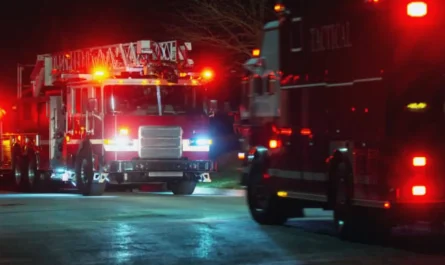Sick of HOA Fines? Here Are 10 Rules They Legally Can t Enforce
I have spoken with other people who feel confined by their homeowners association. Unexpected penalties. letters about trivial matters. rules that seem fictitious. This is for you if you’ve ever been punished for your garbage cans, your garden, or even a flag on your porch.
Because the truth is that HOAs do not have unrestricted authority.Even if they attempt to bluff their way through it, there are actual boundaries to what they may enforce.
All you have to do is understand what is and is not lawful.
I’ll go over ten typical HOA rules in this post that aren’t legally binding, despite the fact that many communities still threaten homeowners with them. Every statement is supported by actual laws, recent court decisions, and professional advice—no nonsense.
Additionally, this serves as a reminder that you have more rights than you may realize if you have ever experienced bullying from your HOA.
What Your HOA Can Enforce (and Where the Line Is)
Since most homeowners get caught up in this, let’s first clarify what your HOA may legally enforce before moving on to the laws they can’t touch.

You accepted what are known as the Covenants, Conditions, and Restrictions (CC&Rs) when you purchased your house. That is the HOA’s strategy. It grants them the authority to oversee common areas, establish criteria for appearance, and collect fees. It makes sense, doesn’t it?
The hitch is that state and federal laws are not superseded by CC&Rs. It’s not always legal just because something is mentioned in your HOA handbook. And many associations are either unaware of that or choose to disregard it.
For instance:
-
Federal law protects your right to install certain
satellite dishes
(FCC s OTARD rule). -
State laws protect things like
xeriscaping
,
political signs
, and
flag displays
. -
The
Fair Housing Act
prevents any kind of rule that discriminates intentionally or not.
Many HOAs rely on your ignorance of these regulations. They impose fines in the hopes that you will pay them without question. However, you can fight back and prevail if you know your true rights.
Pro tip: Start by reviewing your CC&Rs with your state’s HOA regulations and any recent legislation (like as Florida’s 2024 HB 1203) if you’re unsure of what your HOA can lawfully enforce. And always keep a record of everything.
Do you want to see the most prevalent HOA rules that are completely unworkable?Let’s examine the top ten and discuss how to respond when your HOA goes too far.
What Most Articles Get Wrong About HOA Rules
Let’s take a moment to discuss what is absent from the articles you have most likely already read.
You’ve seen the same generic lists on multiple websites if you’ve Googled things your HOA can’t do. Paint colors, flags, and dishes are all superficial. Even though such factors are important, most articles fail to consider the wider picture.
The main problem isn’t just that there are rules; it’s that they’re enforced.
This is something that is rarely brought up:
-
Selective enforcement
: HOAs often target some residents but ignore others. That s not just shady it can be illegal under the Fair Housing Act and your state s HOA statutes. -
No due process
: Homeowners get fined or threatened without any formal hearing or documentation. -
Abuse of power
: Some boards act more like private governments than neighborhood volunteers. They assume no one will push back.
These aren’t typically included in listicles, although they’re the main source of annoyance for homeowners.
Take a look at the actual grievances on Reddit posts liker/fuckHOA, which are replete with screenshots demonstrating how homeowners associations selectively punish individuals for things like lawn gnomes or holiday lights.
This article delves further. We go beyond simply enumerating regulations; we also expose the loopholes, murky areas, and abusive practices that most publications overlook.
That’s what separates understanding the rules from being able to protect oneself.
10 Rules Your HOA Can t Enforce Even If They Try
Every year, homeowners nationwide are unfairly punished for breaking these restrictions. However, regardless of what yourHOA claims in their letter, the majority of these aren’t legally enforceable.
Let’s examine each of them separately.
1. Banning Satellite Dishes or Antennas
Your HOA cannot prohibit you from placing a satellite dish (1 meter or less in diameter) on property that you own or rent out exclusively, such as your yard, patio, or balcony, in accordance with the FCC’s OTARD rule.
Federal law takes precedence over their handbook, even if it contains it. Certain internet and local broadcast TV antennas are subject to the same regulation.
Why this matters: You have the right to legally ignore threats from your HOA to install TV or internet equipment, and you can even file a complaint with the FCC.
2. Prohibiting Flags and Political Signs
Many homeowners associations attempt to limit what you can place in your window or yard. However, you are legally allowed to fly the American flag in the majority of states, and many of them also safeguard signs that are religious, seasonal, or political, particularly during elections.
For instance, your freedom to fly the flag is protected by the Freedom to Display the American Flag Act, even if your homeowners association objects. Certain states, such as Texas and California, go one step farther and safeguard political signs.
Why this matters: Your voice is a part of your front yard. HOAs have the power to control size and placement, but they cannot prohibit your viewpoint.
3. Fining You Without Due Process
It’s a big one. Many HOAs issue parking tickets and other charges quickly, casually, and without prior notice.
However, in the majority of states, they are legally obligated to provide you with written notice, allow you an opportunity to reply, and, upon your request, arrange a hearing.No hidden penalties. No fines that are retroactive.
For instance, Florida’s new HB 1203 law, which goes into effect in July 2024, expressly prohibits fines for early garbage cans or decorations unless adequate warning is provided.
Why this matters: You have the right to contest unjust fines, and if the HOA avoids due process, they are frequently in violation of the law.
4. Selective Enforcement or Discriminatory Rules
Every resident must be subject to the same rules enforced by the HOA. They are breaking federal law under the Fair Housing Act if they target you based on your color, age, religion, or family size, or if they fine you for something they disregard in someone else’s yard.
One of the most frequent abuses is when the board president fines you for the same thing while ignoring their friend.
Why this matters: You don’t have to put up with unfair treatment. Legal action may be warranted if you are being singled out.
5. Banning Gardens, Clotheslines, or Eco-Friendly Yards
Perfect lawns are what some HOAs desire. However, that isn’t always lawful. The right to plant vegetable gardens, build rain barrels, or employ water-saving landscaping (xeriscaping) is protected in a number of states, including Florida, Colorado, and California.
In fact, Florida law now protectsclotheslines and edible gardens, as long as they re not visible from the street.
Why this matters: Even if your HOA doesn’t like the way it looks, you can still save money, cut down on water usage, and still comply with the law.
6. Requiring Traditional Lawns Over Xeriscaping
Many states now prohibit homeowners’ associations from requiring residents to maintain high-water grass lawns due to the increasing prevalence of drought.
For instance,Colorado s Water Rights lawslet you install drought-resistant landscaping, even if your HOA demands sod or daily watering.
Why this matters:You have the right to design a sustainable yard and not get punished for it.
7. Banning Legal Firearms Inside Your Home
HOAs cannot restrict yourSecond Amendment rightsinside your private residence. While they can regulate public or shared areas (like pools or clubhouses),they cannot stop you from legally storing firearms in your home.
Why this matters:Just because you live in a community doesn t mean you lose your constitutional rights.
8. Entering Your Property Without Permission
Unless it s an emergency, most HOAscannot legally enter your propertywithout giving you written notice and a valid reason. That includes peeking over fences, inspecting your backyard, or snooping around your porch.
Check your governing documents, but in most cases, they need either permission or a clause that s clearly written into your agreement.
Why this matters:You have the right to privacy and most HOA board members forget that.
9. Blocking You from Suing the HOA
Some associations include clauses saying you waive your right to sue. But those rarely hold up in court.
While you may be required to try mediation or arbitration first,your right to take legal action can t be blocked entirely.In fact, many successful homeowner lawsuits have started with violations just like the ones above.
Why this matters:If you re being bullied or fined illegally, you can fight back and win.
10. Foreclosing on Your Home Over Small Fines
This one scares a lot of people, and for good reason. In some states, HOAs canstart foreclosureif you don t pay dues or fines but laws vary.
For example, inCalifornia and Florida, an HOA usuallycan t foreclose over fines alone. Only unpaid dues over a certain amount qualify. Always check your state law before panicking.
Why this matters:Missing a fine isn t the same as losing your house. Know where the line is and when you actually need a lawyer.
How to Push Back When Your HOA Crosses the Line
Knowing your rights is one thing. But what do you actually do when your HOA ignores them?
Here s a straight, no-nonsense plan that real homeowners have used to protect themselves and win.
Step 1: Read the Fine Print (Yes, the Boring Stuff)
Start with yourCC&Rsand any rules or bylaws you received when you bought your home. Most HOA overreach happens when the board assumes you ll never read them.
Look for:
- Fining procedures (notice requirements, appeal rights)
- Property access clauses
- Landscaping or signage rules
- Arbitration or legal steps outlined
Once you understand their own playbook, you ll know when they re not following it.
Step 2: Compare Their Rules to State and Federal Law
This is where most homeowners get their power back. Laws like:
-
FCC OTARD rule
(for satellite dishes) -
Fair Housing Act
(protects against discrimination) -
Freedom to Display the American Flag Act
-
Florida HB 1203
(2024 law limiting fines and enforcement)
can override your HOA s rules. Look up your state s HOA laws or search [your state] + HOA homeowners rights.
You ll be surprised how many rules are legally unenforceable.
Step 3: Document Everything
Don t just arguecollect evidence. Photos, letters, screenshots of inconsistent enforcement, texts from the board everything matters if things escalate.
Keep a record of:
- Every notice or fine
- Your replies
- Any differences in how others in your neighborhood are treated
If your HOA is selectively enforcing or breaking due process, this proof is what wins you leverage or even a legal case. Just like you d document everything after a flood or home emergency,here s what to do if your house gets flooded before it s too late. Same principle applies: fast action, clear records, and knowing your rights can save you big time.
Step 4: Show Up, Speak Up
Most HOA boards are small. A few strong voices at a meeting can change the tone fast.
- Bring your evidence.
- Ask for clarification in writing.
- Stay calm, but make it clear you know your rights.
You can alsorally neighborsif others are affected. There s strength in numbers and HOAs know it.
Step 5: Escalate Only If You Have To
If they keep pushing, you have options:
-
File a complaint with your
state s HOA regulatory agency
(not every state has one, but many do). -
Reach out to
local media
(HOA horror stories are media bait). -
Connect with a
property rights attorney
many offer free consultations. - Use leverage: recent news stories, court cases, or state laws that back your position.
For example, in July 2024,Florida made it illegal for HOAs to fine homeowners without proper notice. That s a law worth mentioning if you live in the state or want to push for change in your own. If you re going out of town and don t want to give your HOA any excuses to hassle you while you re gone,check out this guide on how to secure your home before you leave. Burglars aren t the only ones who snoop.
Step 6: Go Public If It s Bigger Than You
Sometimes, going public is your best protection.
Homeowners on Reddit, Twitter, and Facebook have successfully pushed back just by sharing their stories. Real names, real violations, real outcomes. And once the board sees eyes on them, they often back down.
Try looking up:
-
Twitter: @HOALegalNews
-
Facebook group: I Hate My HOA
-
Reddit: r/fuckHOA
You ll find advice, support, and proof that you re not alone.
Bottom line:You re not powerless. The more informed you are, the less they can get away with.
You Have Rights And It s Time to Use Them
If there s one thing I want you to walk away with, it s this:your HOA doesn t get to make the law.They can create rules for the community but those rules still have to follow state and federal law. And more often than not, they don t.
You re not crazy for thinking it feels personal. You re not wrong to question that fine on your mailbox color or that violation letter about your garden. HOAs count on silence. But silence is what lets abuse keep happening.
Now you know better.
So the next time your HOA tries to fine you for something that doesn t feel right don t just pay it. Ask for documentation. Look up the law. Push back.
Because when you do? You re not just standing up for yourself you re forcing them to follow the rules too.
What s the worst HOA rule you ve ever been hit with or seen someone else get fined for?Drop it in the comments. Let s call out the nonsense and help each other fight back.
If you re house hunting or thinking about selling you ll want toavoid these costly home buying and selling mistakesthat many people make when dealing with HOAs. Want more guides like this? VisitBuild Like Newfor smart, practical homeowner advice that actually helps.
Disclaimer:This article is for informational purposes only and does not constitute legal advice. HOA laws vary by state please consult a qualified attorney for guidance specific to your situation.
Table of Contents
-
What Your HOA Can Enforce (and Where the Line Is)
-
What Most Articles Get Wrong About HOA Rules
-
10 Rules Your HOA Can t Enforce Even If They Try
-
1. Banning Satellite Dishes or Antennas
-
2. Prohibiting Flags and Political Signs
-
3. Fining You Without Due Process
-
4. Selective Enforcement or Discriminatory Rules
-
5. Banning Gardens, Clotheslines, or Eco-Friendly Yards
-
6. Requiring Traditional Lawns Over Xeriscaping
-
7. Banning Legal Firearms Inside Your Home
-
8. Entering Your Property Without Permission
-
9. Blocking You from Suing the HOA
-
10. Foreclosing on Your Home Over Small Fines
-
-
How to Push Back When Your HOA Crosses the Line
-
Step 1: Read the Fine Print (Yes, the Boring Stuff)
-
Step 2: Compare Their Rules to State and Federal Law
-
Step 3: Document Everything
-
Step 4: Show Up, Speak Up
-
Step 5: Escalate Only If You Have To
-
Step 6: Go Public If It s Bigger Than You
-
-
You Have Rights And It s Time to Use Them
-
1. Banning Satellite Dishes or Antennas
-
2. Prohibiting Flags and Political Signs
-
3. Fining You Without Due Process
-
4. Selective Enforcement or Discriminatory Rules
-
5. Banning Gardens, Clotheslines, or Eco-Friendly Yards
-
6. Requiring Traditional Lawns Over Xeriscaping
-
7. Banning Legal Firearms Inside Your Home
-
8. Entering Your Property Without Permission
-
9. Blocking You from Suing the HOA
-
10. Foreclosing on Your Home Over Small Fines
-
Step 1: Read the Fine Print (Yes, the Boring Stuff)
-
Step 2: Compare Their Rules to State and Federal Law
-
Step 3: Document Everything
-
Step 4: Show Up, Speak Up
-
Step 5: Escalate Only If You Have To
-
Step 6: Go Public If It s Bigger Than You




